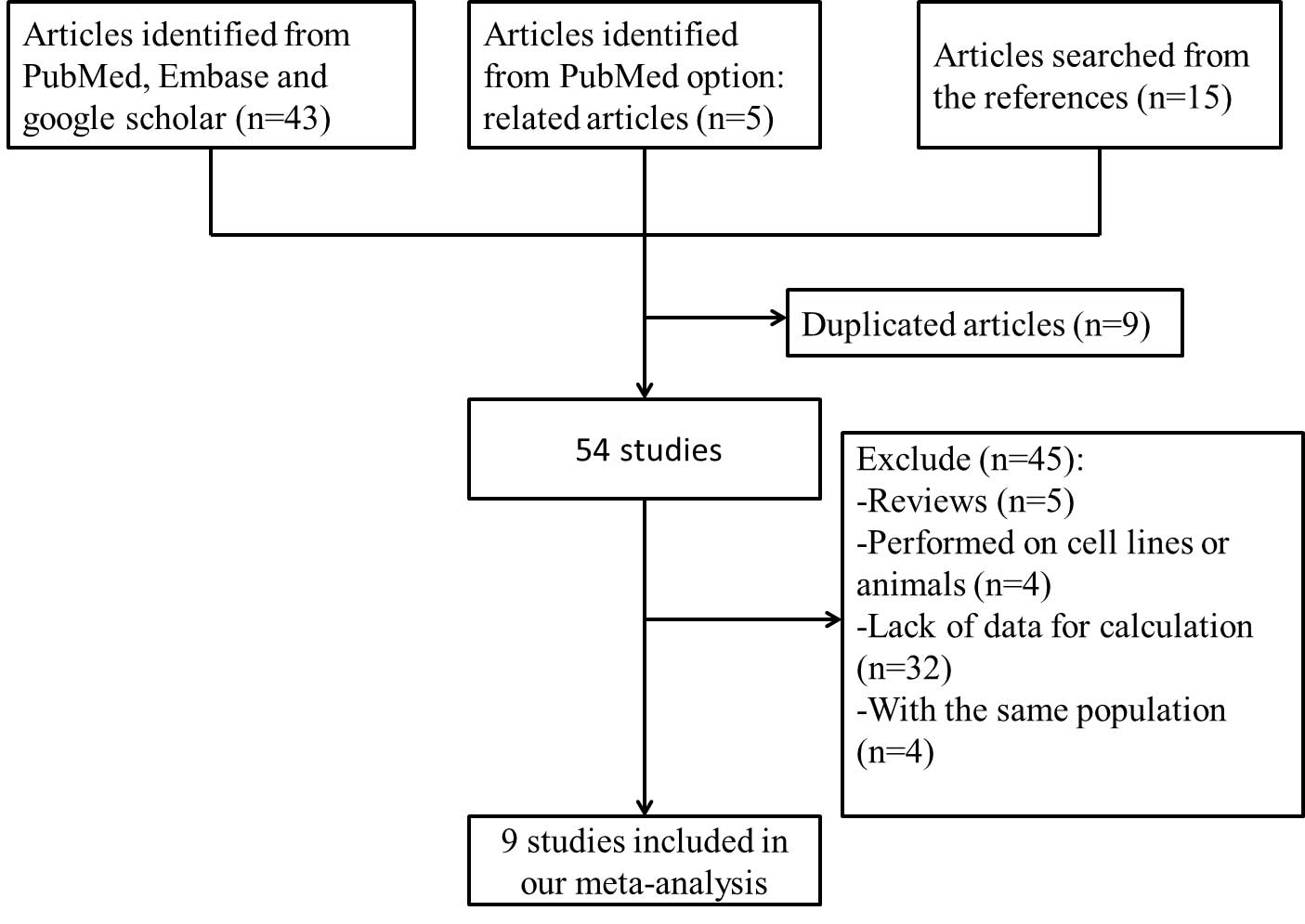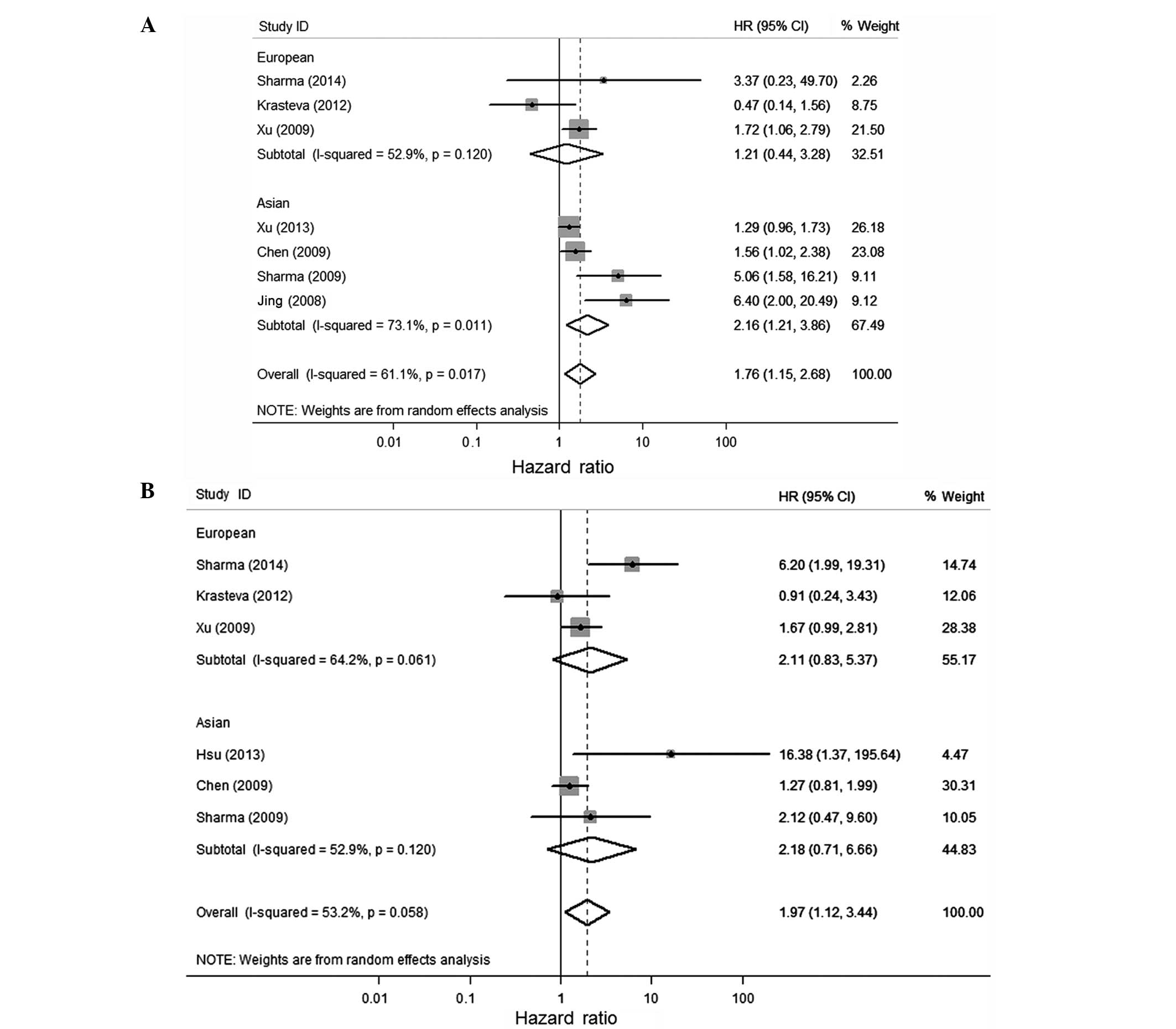|
1
|
Jemal A, Siegel R, Ward E, Hao Y, Xu J and
Thun MJ: Cancer statistics, 2009. CA Cancer J Clin. 59:225–249.
2009. View Article : Google Scholar : PubMed/NCBI
|
|
2
|
Jemal A, Bray F, Center MM, Ferlay J, Ward
E and Forman D: Global cancer statistics. CA Cancer J Clin.
61:69–90. 2011. View Article : Google Scholar : PubMed/NCBI
|
|
3
|
Russo J, Yang X, Hu YF, Bove BA, Huang Y,
Silva ID, Tahin Q, Wu Y, Higgy N, Zekri A, et al: Biological and
molecular basis of human breast cancer. Front Biosci. 3:D944–D960.
1998.PubMed/NCBI
|
|
4
|
Miki Y, Swensen J, ShattuckEidens D,
Futreal PA, Harshman K, Tavtigian S, Liu Q, Cochran C, Bennett LM,
Ding W, et al: A strong candidate for the breast and ovarian cancer
susceptibility gene BRCA1. Science. 266:66–71. 1994. View Article : Google Scholar : PubMed/NCBI
|
|
5
|
Friedenson B: The BRCA1/2 pathway prevents
hematologic cancers in addition to breast and ovarian cancers. BMC
Cancer. 7:1522007. View Article : Google Scholar : PubMed/NCBI
|
|
6
|
Ralhan R, Kaur J, Kreienberg R and
Wiesmüller L: Links between DNA double strand break repair and
breast cancer: Accumulating evidence from both familial and
nonfamilial cases. Cancer Lett. 248:1–17. 2007. View Article : Google Scholar : PubMed/NCBI
|
|
7
|
Hall JM, Lee MK, Newman B, Morrow JE,
Anderson LA, Huey B and King MC: Linkage of early-onset familial
breast cancer to chromosome 17q21. Science. 250:1684–1689. 1990.
View Article : Google Scholar : PubMed/NCBI
|
|
8
|
Birgisdottir V, Stefansson OA,
Bodvarsdottir SK, Hilmarsdottir H, Jonasson JG and Eyfjord JE:
Epigenetic silencing and deletion of the BRCA1 gene in sporadic
breast cancer. Breast Cancer Res. 8:R382006. View Article : Google Scholar : PubMed/NCBI
|
|
9
|
Wu L, Wang F, Xu R, Zhang S, Peng X, Feng
Y, Wang J and Lu C: Promoter methylation of BRCA1 in the prognosis
of breast cancer: A meta-analysis. Breast Cancer Res Treat.
142:619–627. 2013. View Article : Google Scholar : PubMed/NCBI
|
|
10
|
DahlmanWright K, Cavailles V, Fuqua SA,
Jordan VC, Katzenellenbogen JA, Korach KS, Maggi A, Muramatsu M,
Parker MG and Gustafsson JA: International Union of Pharmacology.
LXIV. Estrogen receptors. Pharmacol Rev. 58:773–781. 2006.
View Article : Google Scholar : PubMed/NCBI
|
|
11
|
Mitri Z, Constantine T and O'Regan R: The
HER2 receptor in breast cancer: Pathophysiology, clinical use, and
new advances in therapy. Chemother Res Pract.
2012:7431932012.PubMed/NCBI
|
|
12
|
Bosch A, Eroles P, Zaragoza R, Viña JR and
Lluch A: Triple-negative breast cancer: Molecular features,
pathogenesis, treatment and current lines of research. Cancer Treat
Rev. 36:206–215. 2010. View Article : Google Scholar : PubMed/NCBI
|
|
13
|
Fleiss JL: The statistical basis of
meta-analysis. Stat Methods Med Res. 2:121–145. 1993. View Article : Google Scholar : PubMed/NCBI
|
|
14
|
Tierney JF, Stewart LA, Ghersi D, Burdett
S and Sydes MR: Practical methods for incorporating summary
time-to-event data into meta-analysis. Trials. 8:162007. View Article : Google Scholar : PubMed/NCBI
|
|
15
|
DerSimonian R: Meta-analysis in the design
and monitoring of clinical trials. Stat Med. 15:1237–1252. 1996.
View Article : Google Scholar : PubMed/NCBI
|
|
16
|
Higgins JP, Thompson SG, Deeks JJ and
Altman DG: Measuring inconsistency in meta-analyses. BMJ.
327:557–560. 2003. View Article : Google Scholar : PubMed/NCBI
|
|
17
|
Bax L, Ikeda N, Fukui N, Yaju Y, Tsuruta H
and Moons KG: More than numbers: The power of graphs in
meta-analysis. Am J Epidemiol. 169:249–255. 2009. View Article : Google Scholar : PubMed/NCBI
|
|
18
|
Egger M, Davey Smith G, Schneider M and
Minder C: Bias in meta-analysis detected by a simple, graphical
test. BMJ. 315:629–634. 1997. View Article : Google Scholar : PubMed/NCBI
|
|
19
|
Lau J, Ioannidis JP and Schmid CH:
Quantitative synthesis in systematic reviews. Ann Intern Med.
127:820–826. 1997. View Article : Google Scholar : PubMed/NCBI
|
|
20
|
Sharma P, Stecklein SR, Kimler BF, Sethi
G, Petroff BK, Phillips TA, Tawfik OW, Godwin AK and Jensen RA: The
prognostic value of BRCA1 promoter methylation in early stage
triple negative breast cancer. J Cancer Ther Res. 3:1–11. 2014.
View Article : Google Scholar : PubMed/NCBI
|
|
21
|
Ignatov T, Poehlmann A, Ignatov A,
Schinlauer A, Costa SD, Roessner A, Kalinski T and Bischoff J:
BRCA1 promoter methylation is a marker of better response to
anthracycline-based therapy in sporadic TNBC. Breast Cancer Res
Treat. 141:205–212. 2013. View Article : Google Scholar : PubMed/NCBI
|
|
22
|
Krasteva ME, Bozhanov SS, Antov GG,
Gospodinova ZI and Angelov SG: Breast cancer patients with
hypermethylation in the promoter of BRCA1 gene exhibit favorable
clinical status. Neoplasma. 59:85–91. 2012. View Article : Google Scholar : PubMed/NCBI
|
|
23
|
Xu X, Gammon MD, Zhang Y, Bestor TH,
Zeisel SH, Wetmur JG, Wallenstein S, Bradshaw PT, Garbowski G,
Teitelbaum SL, et al: BRCA1 promoter methylation is associated with
increased mortality among women with breast cancer. Breast Cancer
Res Treat. 115:397–404. 2009. View Article : Google Scholar : PubMed/NCBI
|
|
24
|
Xu Y, Diao L, Chen Y, Liu Y, Wang C,
Ouyang T, Li J, Wang T, Fan Z, Fan T, et al: Promoter methylation
of BRCA1 in triple-negative breast cancer predicts sensitivity to
adjuvant chemotherapy. Ann Oncol. 24:1498–1505. 2013. View Article : Google Scholar : PubMed/NCBI
|
|
25
|
Hsu NC, Huang YF, Yokoyama KK, Chu PY,
Chen FM and Hou MF: Methylation of BRCA1 promoter region is
associated with unfavorable prognosis in women with early-stage
breast cancer. PLoS One. 8:e562562013. View Article : Google Scholar : PubMed/NCBI
|
|
26
|
Sharma G, Mirza S, Yang YH, Parshad R,
Hazrah P, Datta Gupta S and Ralhan R: Prognostic relevance of
promoter hypermethylation of multiple genes in breast cancer
patients. Cell Oncol. 31:487–500. 2009.PubMed/NCBI
|
|
27
|
Chen Y, Zhou J, Xu Y, Li Z, Wen X, Yao L,
Xie Y and Deng D: BRCA1 promoter methylation associated with poor
survival in Chinese patients with sporadic breast cancer. Cancer
Sci. 100:1663–1667. 2009. View Article : Google Scholar : PubMed/NCBI
|
|
28
|
Jing F, Jun L, Yong Z, Wang Y, Fei X,
Zhang J and Hu L: Multigene methylation in serum of sporadic
Chinese female breast cancer patients as a prognostic biomarker.
Oncology. 75:60–66. 2008. View Article : Google Scholar : PubMed/NCBI
|
|
29
|
KarrayChouayekh S, Trifa F, Khabir A,
Boujelbane N, SellamiBoudawara T, et al: Clinical significance of
epigenetic inactivation of hMLH1 and BRCA1 in Tunisian patients
with invasive breast carcinoma. J Biomed Biotechnol.
2009:3691292009.PubMed/NCBI
|
|
30
|
Baldwin RL, Nemeth E, Tran H, Shvartsman
H, Cass I, et al: BRCA1 promoter region hypermethylation in ovarian
carcinoma: a population-based study. Cancer Res. 60:5329–5333.
2000.PubMed/NCBI
|
|
31
|
Esteller M, Silva JM, Dominguez G, Bonilla
F, MatiasGuiu X, et al: Promoter hypermethylation and BRCA1
inactivation in sporadic breast and ovarian tumors. J Natl Cancer
Inst. 92:564–569. 2000. View Article : Google Scholar : PubMed/NCBI
|
|
32
|
Patsopoulos NA, Evangelou E and Ioannidis
JP: Sensitivity of between-study heterogeneity in meta-analysis:
proposed metrics and empirical evaluation. Int J Epidemiol.
37:1148–1157. 2008. View Article : Google Scholar : PubMed/NCBI
|
|
33
|
Sharma G, Mirza S, Parshad R, et al:
Clinical significance of promoter hypermethylation of DNA repair
genes in tumor and serum DNA in invasive ductal breast carcinoma
patients. Life Sci. 87:83–91. 2010. View Article : Google Scholar : PubMed/NCBI
|


















